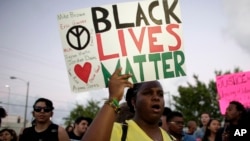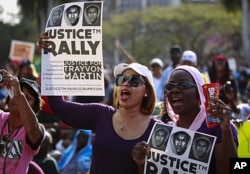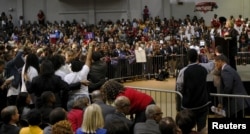Calls to end police brutality and establish meaningful criminal justice reforms have become a part of the political debate in the upcoming U.S. presidential election. One group is taking credit for pushing the issues: Black Lives Matter. The social justice movement thrust its agenda to the forefront of the race for the White House this November.
Congresswoman Sheila Jackson Lee (D-Texas), who supports the movement, said Black Lives Matter activists “can take a great deal of credit for moving the criminal justice agenda forward. The movement changed the attitudes and mindsets of people about police-community relations, gun violence and the crisis mode we need to be in to pass criminal justice reform,” Lee said.
Black Lives Matter began non-violent street protests after the fatal shooting of 17-year-old Trayvon Martin in Florida in 2012.
The organization gained national attention following the death of 18-year-old Michael Brown, who was shot and killed by a white police officer in Ferguson, Missouri in 2014. Since then, the deaths of other unarmed black males at the hands of police officers have inspired more protests across the country.
Now the movement has gotten the attention of politicians running for the White House as it has forced some of the candidates to grapple with the thorny issue of racial inequality. The group has also disrupted some political events.
The movement forced some campaigns to schedule meetings with its activists to discuss common sense solutions. “Our activists look forward to discussing their concerns with other presidential candidates in the future,” said Julius Jones, founder of the Black Lives Matter chapter in Worcester, Massachusetts.
"Each one is being made to offer their racial analysis in the United States. We require that they have an understanding of it. Whatever it takes to get Black Lives Matter on the national agenda is what we're seeking to do and it's important to note that folks want to characterize and judge the movement in a myriad of ways, but what no one can argue with is this is a pressing issue," Jones said.
Last August 2015, a video was released showing Democratic presidential candidate Hillary Clinton meeting with Black Lives Matter activists.
“Look, I don't believe you change hearts," Clinton said, arguing that the movement can't change deep-seated racism. "I believe you change laws, you change allocation of resources, you change the way systems operate. You're not going to change every heart. You're not."
Her challenger, Senator Bernie Sanders (D-VT), also met with representatives of Black Lives Matter and pledged to make meaningful criminal justice reforms a priority if he's elected president.
Among the Republican presidential hopefuls, only former Florida governor Jeb Bush has spoken directly with advocates for the Black Lives Matter movement. "I am committed to restoring opportunity for all Americans and addressing criminal justice reforms," Bush said.
Washington attorney and community activist Nkechi Taifa believes the movement can be a force during the presidential race by addressing issues like mass incarceration, especially among African Americans. "It is not to say that all lives do not matter. What it means is that specific attention at this period, at this time, needs to be placed on people who are most adversely impacted by the laws and policies that are going on," she said.
Alicia Garza, one of the founders of Black Lives Matter, said the group would not endorse a presidential candidate in the 2016 election. "In the future, the organization may become more involved with candidates and parties, and even run candidates, but we're not there yet. Each candidate should expect to be held accountable," she said. "That is our political position in this current election cycle."














